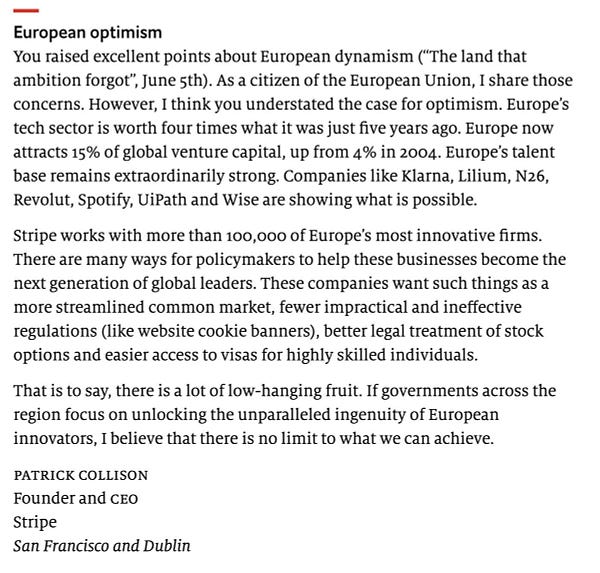I traveled to my hometown, Macon, Georgia, this week for the first time since the pandemic started. Now, I’m in New Orleans for a belated bachelor party. After a few busy weeks for the newsletter, I thought I’d touch on some odds and ends. There are some recent headlines I wanted to flag, a few themes in startup world that have been on my mind, and some loose threads that we might pick up in more detail in the future. These are also areas where I’d happily take off the record tips. So feel free to email me at eric@newcomer.co.
Y Combinator Ejections
I read with great interest this TechCrunch story, written by Natasha Mascarenhas and Connie Loizos, about two founders who say they got kicked out of Y Combinator for talking publicly about internal conversations on the accelerator’s forums:
The two founders, Dark CEO Paul Biggar and Prolific CEO and co-founder Katia Damer, say they were removed from YC after publicly critiquing YC — for very different reasons. Biggar had noted on social media back in March that another YC founder was tipping off people on how to cut the vaccine lines to get an early jab, while Damer expressed worry and frustration more recently about the alumni community’s support of a now-controversial alum, Antonio García Martínez.
Y Combinator says that the two founders were removed from Bookface because they broke community guidelines, namely the rule to never externally post any internal information from Bookface.
TechCrunch concludes with a word of warning for YC.
Because of its successful track record, YC may be more powerful as an institution than any one company, but rivals are always looking for weaknesses, and asking members not to air their grievances outside of YC could ultimately impair the outfit. A generation of founders and operators is showing it is less and less willing to suppress a viewpoint in the service of others, and the most talented of these individuals have no shortage of options when it comes to both mentorship and capital.
It’s a thoughtful piece and I’m a big believer in transparent organizations1 — but I’m extremely skeptical that YC’s culture of confidentiality will hurt its position in the startup ecosystem. For one, YC is so powerful and so valuable to founders that it feels pretty insulated from direct competition. There’s a long way between YC and anyone who would disrupt it. Second, so long as we live in an internet culture where public disagreements become toxic culture war fodder, founders will cherish having a space where they can disagree vociferously in private. (I miss my old college newspaper email forums for this reason — and the Discord community Sidechannel is an attempt to recreate a semi-private space, though we don’t have any YC-style contractual obligations to confidentiality).
YC has been pretty successful at keeping its drama inside the tent. That’s been to YC’s benefit for sure.
Here’s a telling case study: It’s stunning how little scrutiny Sam Altman’s various title changes at Y Combinator received in the big business publications.2 This is someone who was profiled in the New Yorker and who ran the most powerful startup manufacturer in the world.
Altman went from president, to chairman, to being an advisor, to having no affiliation with Y Combinator without much detailed reporting from the press. YC successfully swept, what seems to be a real schism, under the rug.3
First YC announced that Altman would become chairman. On March 8, 2019, the firm wrote, “Sam is transitioning to Chairman of YC.”4
Then that same month, YC announced that Geoff Ralston would become president of YC. Altman wrote at the time, “I will, of course, remain an advisor to YC, and will be around to help Geoff as he takes on his new role.” It seems that was YC’s way of saying that Altman would not in fact be the chairman of YC, despite headlines all around the web that had run earlier that month saying that he would be.5
But Altman wouldn’t become a formal advisor either.
On January 27, 2020, Wikipedia user Opazazzyzen updated Altman’s Wikipedia to say that Altman is “no longer affiliated with YC.”
If you Google “Opazazzyzen,” an Instagram account for Lindsay Amos is the first result. She is the director of communications for Y Combinator. Based on my internet sleuthing, Amos seemed to have quietly announced Altman’s role change on Wikipedia. Her update didn’t include a citation (and still doesn’t).
I emailed Amos about the weird Wikipedia post. She wrote, “In May 2019, we shared that Geoff Ralston would take over as President of YC from Sam Altman. Sam noted he would be an advisor to YC and would be transitioning to CEO of OpenAI. There was every intention for Sam to become an advisor but the plans never moved forward. So, the title/role never happened. I updated the information on our end (i.e. Wikipedia, Crunchbase, etc.) to combat confusion.”
I’m fixating on this strange, some might say duplicitous, public communication here because I think it really reflects YC’s attitude toward the media and the public. It matters because there’s a strong contingent of the YC community, including Coinbase’s Brian Armstrong and YC co-founder Paul Graham, who are pressing the case against the media.
But when YC communicated publicly6 about its most sensitive personnel change it didn’t prioritize openness and transparency. So I’m left wondering whether the anti-media contingent of YC really has a problem with the media — or they just think they should be able to spin stories however they want. YC basically got away with underselling Altman’s departure.7
Amos emailed me that despite YC’s decision to kick founders off its private social network, YC still believes in free speech. “We believe strongly in free speech and are open to criticism. People are allowed to criticize YC and would not get kicked out of the community for doing so,” she wrote.
I guess those critics just have to make their objections without the facts and evidence that would be key components of any informed public dissent.
SoftBank Is Back!
I have felt pretty vindicated since I published “Is SoftBank the New SoftBank?” on April 30. About two weeks later, SoftBank upped its fund size (something I predicted in the post). SoftBank Vision Fund 2 went from $10 billion to $30 billion, backed by SoftBank Group Corp.
This week was especially validating to the SoftBank is back thesis:
Fintech company Klarna raised $639 million at $45.6 billion in a round led by SoftBank Vision Fund 2.
SoftBank’s Latin American fund co-led a $250 million investment in Latin American unicorn Clip.
The Information reported Wednesday that SoftBank is in talks to invest in Chinese software company Tungee at a $1.3 billion valuation.
Earlier this week, Bloomberg reported that Flipkart is in talks with SoftBank and sovereign wealth funds to raise at least $3 billion at a $40 billion valuation.
According to Didi’s S-1, which was filed today, SoftBank is the largest shareholder in the Chinese ride sharing company. SoftBank owns 21.5% of Didi. Uber is the second largest shareholder with 12.8%.
Faire Announces $7 Billion Valuation
Like I reported May 25, Sequoia led the fundraising round. The wholesale marketplace company raised $260 million.
Trump Officials in Startup Land
For all my talk of moderation on Sunday, there are areas where I think we should take a hard line: We shouldn’t welcome Trump administration political officials back into polite society. Donating to Republicans who supported rejecting the results of the election should be beyond the pale. Fundraising for the the National Republican Congressional Committee amounts to supporting a group of people who are eroding democracy.
So this headline definitely piqued my interest: “Jason Miller to head tech startup that could become Trump platform.”
Longtime senior Donald Trump adviser Jason Miller is taking over as chief executive officer of a tech startup company that could be used by the former president.
Miller’s company is currently developing a social media platform that is being considered for use by Trump. People familiar with the discussions stress that no final decision has been made by the former president about which platform he will use.
Where there are startups, there’s usually venture capital money. So I’m definitely keeping a watchful eye as to whether a Silicon Valley VC cuts Miller’s company a check.


Patrick Collison Offers a Spirited Defense of Europe
Reporters have a strong professional interest to believe as much!
Connie Loizos asked when Sam Altman left the president role, “Did Sam Altman make YC better or worse?” As much sniping as Altman can get behind the scenes, YC certainly landed a ton of great investments under his watch.
One source attributed some of the phased transition to appeasing YC’s limited partners. I don’t have the full story on the tension between Altman and YC’s partnership. I know that Altman had pushed to bring YC to China and there was some resistance to that. YC ultimately unwound that move. Altman was also spending more and more time at OpenAI, annoying some of the YC partners. Also ever media-savvy, Altman became publicly synonymous with YC when the accelerator truly runs as a partnership. That ruffled some feathers. To say there was a falling out is complicated by the YC founders’ longstanding support for Altman.
Loizos noted that Altman would no longer chairman in her coverage of the announcement. I feel like she kind of buried the tidbit and most of the press missed it altogether.
You might say they were “going direct.”
By slowly deescalating Altman’s role, it was much easier for YC to suggest that there wasn’t bad blood. Altman was becoming chairman! That wouldn’t end up being true. But by the time Altman had no connection to the firm, the news cycle around his departure had long since passed.








Epic reporting @EricNewcomer YC seems to be holding on to relevance off it’s past vs. the now while Masa, a16z, and others are taking risks on the future. @PatrickC @stripe is brilliant.